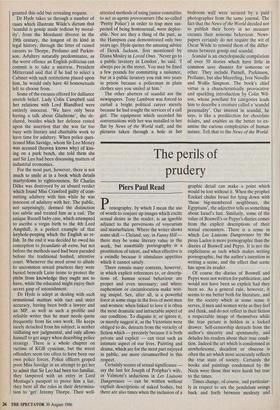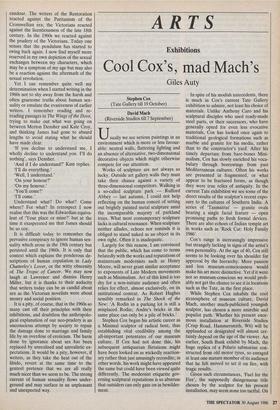The perils of prudery
Piers Paul Read
Pornography, by which I mean the use of words to conjure up images which excite sexual desire in the reader, is an ignoble adjunct to the perversions of voyeurism and masturbation. Where the writer shows some skill — Cleland, say, in Fanny Hill there may be some literary value in the work, but essentially pornography is a prostitution of talent, and when effective is a swindle because it stimulates appetites which it cannot satisfy.
There remain many contexts, however, in which explicit references to, or descrip- tions of, human sexual behaviour are proper and even necessary; and where euphemism or circumlocution make writ- ing insipid. Sex, after all, is a powerful force at some stage in the lives of most men and women: when linked to love it is often the most dramatic and intractable aspect of our condition. To disguise it, or ignore it, or merely suggest it, as the Victorians were obliged to do, detracts from the veracity of fiction which — precisely because it is both private and explicit — can treat such an intimate aspect of our lives. Painting and drama, which are for the most part enjoyed in public, are more circumscribed in this respect.
Certainly scenes of sexual significance say the lust for Joseph of Potiphar's wife, or Valmont's seductions in Les Liaisons Dangereuses — can be written without explicit descriptions of naked bodies, but there are also times when the inclusion of a graphic detail can make a point which would be lost without it. When the prophet Ezekiel chides Israel for lying down with `those big-membered neighbours, the Egyptians', the adjective tells us something about Israel's lust. Similarly, some of the value of Boswell's or Pepys's diaries comes from the explicit descriptions of their sexual encounters. There is a sense in which Les Liaisons Dangereuses by the pious Laclos is more pornographic than the diaries of Boswell and Pepys. It is not the explicitness as such which makes writing pornographic, but the author's intention in writing a scene, and the effect that scene has upon its reader.
Of course the diaries of Boswell and Pepys were not written for publication, and would not have been so explicit had they been so. As a general rule, however, it seems to me better both for literature, and for the society which in'-some sense it serves, if men and women write as they feel and think, and do not reflect in their fiction a respectable image of themselves while the true picture is hidden in a locked drawer. Self-censorship detracts from the author's sincerity and spontaneity, and deludes his readers about their true condi- tion. Indeed the art which is condemned as unwholesome, decadent or obscene is often the art which most accurately reflects the true state of society. Certainly the books and paintings condemned by the Nazis were those that were harsh but true to the times.
Times change, of course, and particular- ly in respect to sex the pendulum swings back and forth between modesty and candour, The writers of the Restoration reacted against the Puritanism of the Cromwellian era; the Victorians reacted against the licentiousness of the late 18th century. In the 1960s we reacted against the prudery of the Victorians. Today one senses that the pendulum has started to swing back again. I now find myself more reserved in my own depiction of the sexual exchanges between my characters, which may be a symptom of my age but may also be a reaction against the aftermath of the sexual revolution.
Yet I can remember quite well my determination when I started writing in the 1960s not to shy away from the harsh and often gruesome truths about human sex- uality or emulate the evasiveness of earlier writers. I remember reading and re- reading passages in The Wings of the Dove, trying to make out what was going on between Merton Densher and Kate Croy, and thinking James had gone to absurd lengths to avoid stating what he should have made clear.
`If you decline to understand me, I wholly decline to understand you. I'll do nothing', says Densher.
`And if I do understand?' Kate replies. `I'll do everything.'
`Well, I understand.'
`On your honour?'
`On my honour.'
`You'll come?'
`I'll come.'
Understand what? Do what? Come where? For what? In retrospect I now realise that this was the Edwardian equiva- lent of 'Your place or mine?' but at the time it exasperated me that James should be so coy.
It is difficult today to remember the pervasive conspiracy to ignore human sex- uality which arose in the 19th century but persisted until the 1960s. It is only that context which explains the ponderous de- scriptions of human copulation in Lady Chatterley's Lover, or the witty obscenity of The Tropic of Cancer. We may now laugh at Lawrence and dismiss Henry Miller, but it is thanks to their audacity that writers today can be as candid about sex as the Victorian novelists were about money and social position.
It is a pity, of course, that in the 1960s so many cast off their principles with their inhibitions, and doubtless the anthropolo- gical explanation of our neo-prudery is an unconscious attempt by society to repair the damage done to marriage and family life by an overdose of eroticism. The harm done by ignorance about sex has been replaced by unrealised and unrealistic ex- pectations. It would be a pity, however, if writers, as they take the heat out of the libido, revert at the same time to the genteel pretence that we are all really much nicer than we seem to be. The strong current of human sexuality flows under- ground and may surface in an unpleasant and unexpected way.









































 Previous page
Previous page